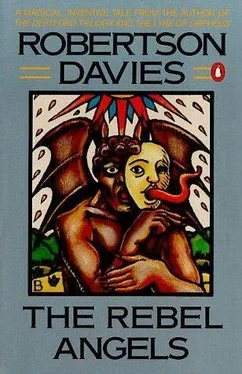Robertson Davies - The Rebel Angels
Здесь есть возможность читать онлайн «Robertson Davies - The Rebel Angels» весь текст электронной книги совершенно бесплатно (целиком полную версию без сокращений). В некоторых случаях можно слушать аудио, скачать через торрент в формате fb2 и присутствует краткое содержание. Жанр: Триллер, на английском языке. Описание произведения, (предисловие) а так же отзывы посетителей доступны на портале библиотеки ЛибКат.
- Название:The Rebel Angels
- Автор:
- Жанр:
- Год:неизвестен
- ISBN:нет данных
- Рейтинг книги:5 / 5. Голосов: 1
-
Избранное:Добавить в избранное
- Отзывы:
-
Ваша оценка:
- 100
- 1
- 2
- 3
- 4
- 5
The Rebel Angels: краткое содержание, описание и аннотация
Предлагаем к чтению аннотацию, описание, краткое содержание или предисловие (зависит от того, что написал сам автор книги «The Rebel Angels»). Если вы не нашли необходимую информацию о книге — напишите в комментариях, мы постараемся отыскать её.
The Rebel Angels — читать онлайн бесплатно полную книгу (весь текст) целиком
Ниже представлен текст книги, разбитый по страницам. Система сохранения места последней прочитанной страницы, позволяет с удобством читать онлайн бесплатно книгу «The Rebel Angels», без необходимости каждый раз заново искать на чём Вы остановились. Поставьте закладку, и сможете в любой момент перейти на страницу, на которой закончили чтение.
Интервал:
Закладка:

Robertson Davies
The Rebel Angels
The first book in the Cornish series, 1981
Second Paradise I
"Parlabane is back."
"What?"
"Hadn't you heard? Parlabane is back."
"Oh my God!"
I hurried on down the long corridor, through chattering students and gossiping faculty members, and again I overheard it, as another pair of professors met.
"You haven't heard about Parlabane, I suppose?"
"No. What should I have heard?"
"He's back."
"Not here?"
"Yes. In the college."
"Not staying, I hope?"
"Who's to say? With Parlabane, anyhow."
This was what I wanted. It was something to say to Hollier when we met after nearly four months apart. At that last meeting he had become my lover, or so I was vain enough to think. Certainly he had become, agonizingly, the man I loved. All through the summer vacation I had fretted and fussed and hoped for a postcard from wherever he might be in Europe, but he was not a man to write postcards. Not a man to say very much, either, in a personal way. But he could be excited; he could give way to feeling. On that day in early May, when he had told me about the latest development in his work, and I – so eager to serve him, to gain his gratitude and perhaps even his love – did an inexcusable thing and betrayed the secret of the bomari to him, he seemed lifted quite outside himself, and it was then he took me in his arms and put me on that horrible old sofa in his office, and had me amid a great deal of confusion of clothing, creaking of springs, and peripheral anxiety lest somebody should come in.
That was when we had parted, he embarrassed and I overcome with astonishment and devotion, and now I was to face him again. I needed an opening remark.
So – up the two winding nights of stairs, which the high ceilings in St. John's made rather more like three flights. Why was I hurrying? Was I so eager to see him? No, I wanted that, of course, but I dreaded it as well. How does one greet one's professor, one's thesis director, whom one loves and who has had one on his old sofa, and whom one hopes may love one in return? It was a sign of my mental state that I was thinking of myself as "one", which meant that my English was becoming stiff and formal. There I was, out of breath, on the landing where there were no rooms but his, and on the study door was his tattered old hand-written sign saying "Professor Hollier is in; knock and enter". So I did, and there he was at his table looking like Dante if Dante had had better upper teeth, or perhaps like Savonarola if Savonarola had been handsomer. Stumbling – a little lightheaded – I rattled out my scrap of news.
"Parlabane is back."
The effect was more than I had reckoned for. He straightened in his chair, and although his mouth did not open, his jaw slackened and his face had that look of intentness that I loved even more than his smile, which was not his best expression.
"Did you say that Parlabane was here?"
"That's what they're all saying in the main hall."
"Great God! How awful!"
"Why awful? Who's Parlabane?"
"I dare say you'lll find out soon enough. – Have you had a good summer? Done any work?"
Nothing to recall the adventure on the sofa, which was right beside him and seemed to me to be the most important thing in the room. Just professor-questions about work. He didn't give a damn if I'd had a good summer. He simply wanted to know if I had been getting on with my work – which was a niggling little particle of the substructure of his work. He hadn't even asked me to sit down, and brought up as I had been I could not sit in the presence of a professor until asked. So I began to explain what work I had been doing, and after a few minutes he noticed that I was standing and waved me to a chair. He was pleased with my report.
"I've arranged that you can work in here this year. Of course you've got your own dog-hole somewhere, but here you can spread out books and papers and leave things overnight. I've been clearing this table for you. I shall want you near."
I trembled. Do girls still tremble when their lovers say they want them near? I did. Then -
"Do you know why I want you near?"
I blushed. I wish I didn't blush but at twenty-three I still blush. I could not say a word.
"No, of course you don't. Couldn't possibly. But I'lll tell you, and it will make you jump out of your skin. Cornish died this morning."
Oh, abomination of desolation! It wasn't the sofa and what the sofa meant.
"I don't think I know about Cornish."
"Francis Cornish is – was – undoubtedly the foremost patron of art and appreciator and understander of art this country has ever known. Immensely rich, and spent lavishly on pictures. They'lll go to the National Gallery; I know because I'm his executor. Don't say anything about that because it's not to be general knowledge yet. He was also a discriminating collector of books, and they go to the University Library. But he was a not-so-discriminating collector of manuscripts; didn't really know what he had, because he was so taken up with the pictures he hadn't much time for other things. The manuscripts go to the Library, too. And one of those manuscripts will be the making of you, and will be quite useful to me, I hope. As soon as we can get our hands on it you will begin your serious work – the work that will put you several rungs up the scholarly ladder. That manuscript will be the guts of your thesis, and it won't be some mouldy, pawed-over old rag of the kind most students have to put up with. It could be a small bombshell in Renaissance studies."
I didn't know what to say. I wanted to say: am I just a student again, after having been tumbled by you on the sofa? Can you really be so unfeeling, such a professor? But I knew what he wanted me to say, and I said it.
"How exciting! How marvellous! What's it about?"
"I don't really know, except that it's in your line. You'lll need all your languages – French, Latin, Greek, and you may have to bone up some Hebrew."
"But what is it? I mean, could you be so interested if you really didn't know?"
"I can only say that it is very special, and it may be a – a bombshell. But I have a great deal to get through before lunch, so we must put off any further talk about it until later. You'd better move your stuff in here this morning and put a sign on the door to say you're inside. – Nice to see you again."
And with that he shuffled off in his old slippers up the steps into the big inner room which was his private study, and where his camp-bed lurked behind a screen. I knew because once, when he was out, I had peeped. He looks at least a million, I thought, but these academic wizards are shape-shifters: if his work goes well he will come out of that door within two hours, looking thirtyish, instead of his proper forty-five. But for the present, he was playing the Academic Old Geezer.
Nice to see me again! Not a kiss, not a smile, not even a handshake! Disappointment worked through me like a poison.
But there was time, and I was to be in his outer room, constantly under his eye. Time works wonders.
I was sufficiently bitten by the scholarly bug to feel another kind of excitement that somewhat eased my disappointment. What was this manuscript about which he was so evasive?
2
I was arranging my papers and things on the table in the outer room after lunch when there was a soft tap at the door and in came someone who was certainly Parlabane. I knew everyone else in St. John's who might have turned up in such a guise; he was wearing a cassock, or a monkish robe that had just that hint of fancy dress about it that marked it as Anglican rather than Roman. But he wasn't one of the divinity professors of St. John's.
Читать дальшеИнтервал:
Закладка:
Похожие книги на «The Rebel Angels»
Представляем Вашему вниманию похожие книги на «The Rebel Angels» списком для выбора. Мы отобрали схожую по названию и смыслу литературу в надежде предоставить читателям больше вариантов отыскать новые, интересные, ещё непрочитанные произведения.
Обсуждение, отзывы о книге «The Rebel Angels» и просто собственные мнения читателей. Оставьте ваши комментарии, напишите, что Вы думаете о произведении, его смысле или главных героях. Укажите что конкретно понравилось, а что нет, и почему Вы так считаете.












